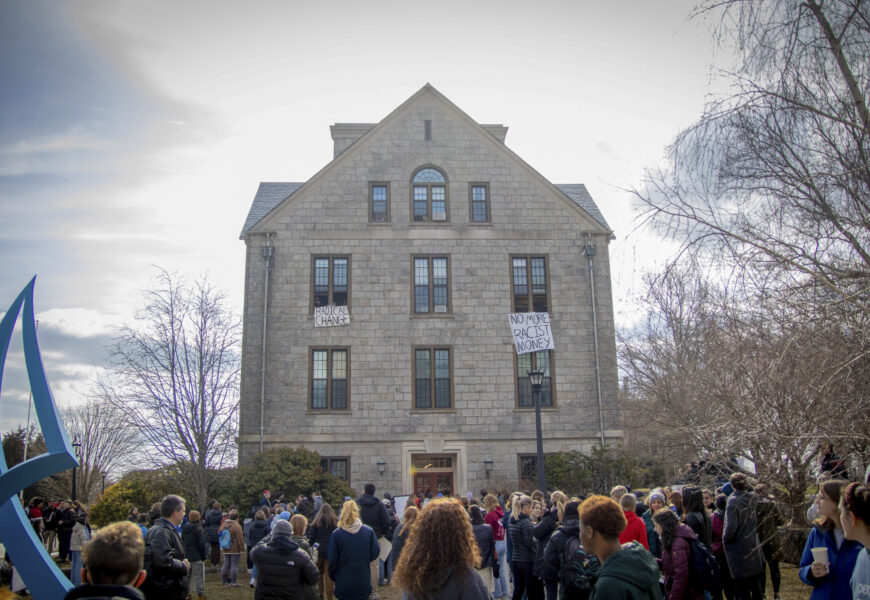Courtesy of Robbie Lynch ’24
March 24 of this year marked the one year anniversary since the fourth Fanning occupation protest took place at Connecticut College, ultimately leading to the resignation of former President Katherine Bergeron. According to The College Voice, Bergeron’s resignation came 46 days after former Dean of Institutional Equity and Inclusion Rodman King resigned in protest against Bergeron’s decision to host a fundraiser at a country club that is infamous for its reports of racism and antisemitism.
As a result of King’s resignation, the student-led group The Student Voices for Equity (SVE) formed and became the face of the protests. The five SVE-affiliated student-run organizations were Asian and Asian American Students in Action (ASIA), Black Student Union (BSU), Connecticut College Hillel, Las Voces Unidas (LVU), Movimiento Estudiantil Chicano de Aztlán (MEChÁcd), The People of Color Alliance (POCA), and Disability Affinity Club. On Feb. 23, 2023, SVE posted a petition online with eight demands, which included, but were not limited to, the resignation of Katherine Bergeron, a transparent Presidential search, and the establishment of “greater and distinct resources for BIPOC, LGBTQIA+, undocumented, international, first-gen, Disabled, and low-income students.” With the aftermath of the protests being less publicized now, the question that remains after the one-year anniversary is whether SVE’s demands are still being honored by the College.
The College Voice spoke with one of the founders of SVE, who wished to remain anonymous. When asked about the current status of the organization, the student described the group as “dormant.” As the student explained, “Certain members within the group are still in contact. We graduated a number of people who were involved and even though we still update them a little bit about stuff on campus, a significant number of the people that were involved were seniors and are no longer on campus so that has definitely impacted the group.” Currently, SVE doesn’t “necessarily organize meetings, but definitely keep[s] each other apprised of their awareness of changes on campus and of the stuff going on within their different affinity groups and they definitely continue to push their demands and the culture changes that they want to see as much as they can and using the influence that they have,” explains the student.
Even though SVE is not an active organization, student organizations are currently ensuring that SVE’s demands are being met by the administration and the Board of Trustees. The student explained that the same affinity groups that were involved with SVE last year still care about the demands and have continued their involvement in the community “in a softer, quieter way but no less impactful.” Moreover, from their perspective, they have noticed an increase in resources and representation for BIPOC, LGBTQIA+, undocumented, international, first-gen, Disabled, and low-income students, etc. within the past year. Put simply, “obstacles are going away and supports are being instituted,” explains the student.
In an email from SGA last November, the Interim Dean of Equity and Inclusion, Nakia Hamlett, instituted Developmental Task Forces. The goal of this initiative is for each task force to further understand specific institutional problems that SVE highlighted last year. By the end of the semester, these teams will create “a summative report for the incoming President by Summer 2024.” The three teams are: Student Support and Equity Compliance, Faculty and Staff Retention, and Campus Climate and Communication. The Student Support and Equity Compliance task force will focus on the “unique and varied needs of students including challenges related to the infrastructure of the College”. The Faculty and Staff Retention and Satisfaction task force will focus on “understanding factors related to why staff and faculty stay or leave the College.” The Campus Climate and Communication task force will focus on “examining key aspects of culture and climate with the aim of improving communication and developing recommendations for engaging the campus community in fun and innovative education and social events.
Another initiative is from the recent announcement on March 28 that the College will be opening a Disability Cultural Center located in Smith sometime during the Fall of 2024. This new initiative was listed under one of SVE’s demands as well as in the constitution for disabled students. “I am beyond excited and encouraged by the new disability cultural center opening at Conn. The climate around disability, visibility and activism has changed notably and positively since I first arrived here at Conn and I can’t wait to see what the disability cultural center will empower us to do in the future,” states the student. Two other cultural centers were announced to be open next semester: one for international students and a social/prayer center for Muslim students in Knowlton.
While the behind the scenes of what is going on in the administration is quiet, it is evident that significant changes have been made since the protests a year ago. Ranging from the Development Task Forces to the announcement of the opening of three new centers, time will only tell how much more institutional change Connecticut College will undergo in years to come.










